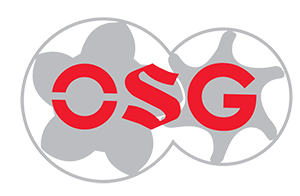Compressing gas is a process of consuming external energy to make gas gain pressure potential energy. The compressor is the creator of compressed gas. Therefore, the basic performance of the screw air compressor air end is inseparable from these four aspects: pressure, flow, power and specific power
Basic performance of screw air compressor air end – pressure
Obtaining the pressure potential energy of compressed air is the most basic performance of air compressors, and screw air compressors are no exception. The main engine of screw air compressors increases the pressure of air by consuming external energy. The higher the pressure, the more energy is consumed, and the higher the requirements for the main engine. Usually we divide air compressors into four categories according to output pressure:
Low pressure: 0.2~1.0MPa
Medium pressure: 1.0~10MPa
High pressure: 10~100MPa
Ultra-high pressure: above 100MPa
Screw air compressors usually have an output pressure of 0.2~4.0MPa, which means that their performance, feasibility and economy are better in this range. This is determined by the structure and working mode of the compressor air end, and it is also the pressure segment with the most market demand.
The compressed air pressure provided by the air compressor is mainly measured by the pressure ratio, which is the ratio of the output pressure Pd to the suction pressure Ps. The higher the ratio, the higher the output pressure.
ε=Pd/Ps Formula (6)
For the main engine of the screw air compressor, there are internal pressure ratio and external pressure ratio.
Internal pressure ratio: the ratio of the pressure in the inter-tooth volume of the main engine to the suction pressure, which is determined by the position and shape of the suction and exhaust ports;
External pressure ratio: the ratio of the pressure in the exhaust pipe to the suction pressure. The suction and exhaust pressures required for the operating conditions or process flow.
When the internal pressure ratio ≠ the external pressure ratio, the main engine will consume more power; when the internal pressure ratio = the external pressure ratio, the main engine is in the best state.
For the main engine of the screw air compressor, when the main engine, ambient temperature, suction pressure, main engine speed and other factors are the same, the higher the output pressure, the higher the power consumption.
Basic performance of screw air compressor air end – flow
Flow is usually composed of mass flow and volume flow. In the industry specifications and standards of air compressor systems, we usually use volume flow as the flow measurement method, which is also called exhaust volume or nameplate flow in my country: under the required exhaust pressure, the volume of gas discharged by the air compressor per unit time is converted to the intake state, that is, the volume value of the suction pressure at the first-stage intake pipe and the suction temperature and humidity. The unit is m3/min. The volume flow is divided into actual volume flow and standard volume flow.
Usually, samples, selections, and machine nameplates use standard volume flow. Due to the industry, region and use, the standard volume flow in the compressed air market demand has two definitions according to the difference in standard state (temperature, pressure and components):
The standard state is pressure P=101.325KPa; standard temperature T=0℃; relative humidity is 0%. It is often encountered in industrial gas, chemical industry or bidding documents, referred to as “standard square”, usually with the formula symbol “VN” and the unit of Nm3/min.
The standard state is pressure P = 101.325KPa; standard temperature T = 20℃; relative humidity is 0%. It is usually used in the standards of the compressed air industry and is called “standard working conditions”. The symbol is usually “V” and the unit is m3/min.
Usually, the standard volume flow rate used in our air compressor industry is the latter. The volume flow rate conversion under the two states can be calculated by the formula:
V(m3/min)=1.0732VN(Nm3/min) Formula (7)
For the main engine of the screw air compressor, under the same other conditions, the larger the rotor center distance, the larger its volume flow rate; the higher the main engine speed, the larger its volume flow rate.
V volume flow rate = qv main engine compression volume × n head speed Formula (8)
qv=CΨqv0Z1n=CΨCn1nλD3 Formula (9)
Where Z1——number of teeth of the male rotor; n——speed of the male rotor; λ——rotor aspect ratio; D——outer diameter of the male rotor.
Therefore, for the sake of economy, we usually reduce the types of main engines and can adjust the exhaust volume of the air compressor by determining the main engine speed to meet market demand.
However, the speed of the screw compressor main engine cannot be infinitely high, usually between 800 and 10,000 rpm. Therefore, the screw main engine manufacturer develops main engines with different volume flow ranges to meet the flow requirements of the screw compressor.
Screw air compressor air end specific power and calculation
The shaft power consumed by the volume flow per unit time when the air compressor air end is working. The unit of specific power is: kW/(m3/min).
The calculation formula is as follows:
SER air end = Pd air end/qv Formula (10)
Pd air end – air end shaft power;
qv – air end volume flow per unit time
Its specific power value is:
SER air end = 117/23.1 = 5.065 (kW/(m3/min))
The smaller the specific power value of the screw air compressor air end, the lower its energy consumption and the better the air end performance. Under the condition of constant flow, the higher the output pressure, the greater the air end shaft power, so the greater its specific power value.
Each screw compressor has an optimal specific power value, which is related to the speed of the main engine. When the main engine speed is too low, the leakage increases, the gas volume decreases, and the specific power value becomes higher; when the main engine speed is too high, the friction increases, the shaft power increases, and the specific power value becomes higher. But there must be an optimal speed that makes the specific power value the lowest. This is why it is not necessarily correct to say that the larger the main engine, the more energy-saving it is.
When we design screw compressors and variable frequency compressors, we must ensure quality while also considering the economy, standardization and modularity of the main engine. Therefore, we will use the main engine specific power value curve to design and develop screw compressors with different pressures and flows.
Post time: Jul-17-2024








